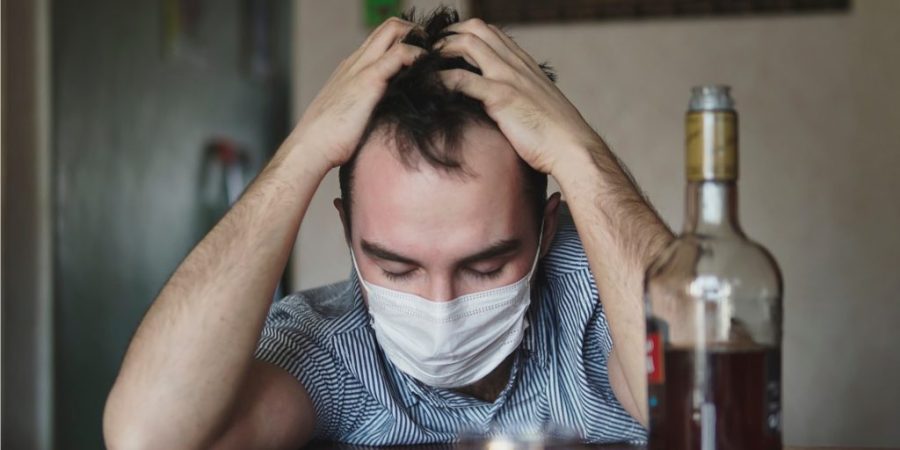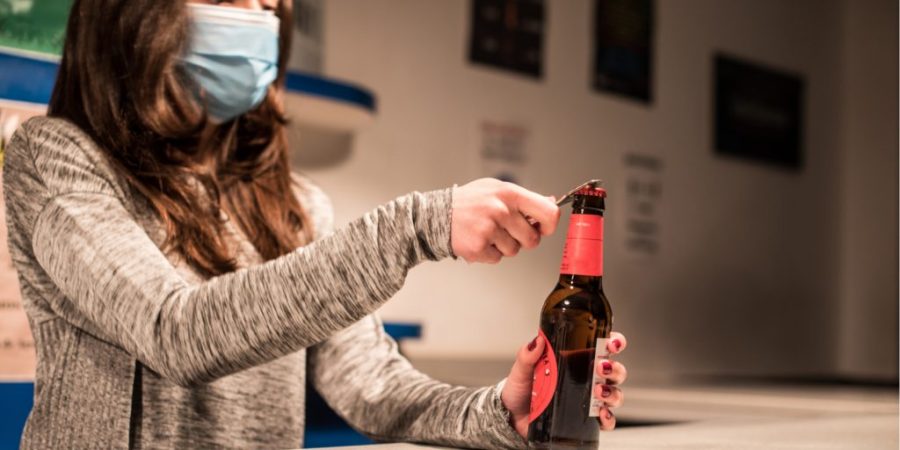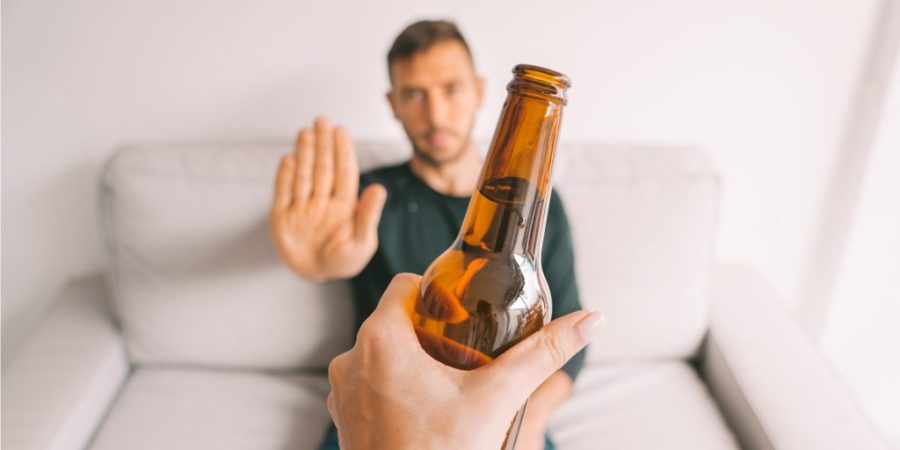
Excessive consumption of alcohol isn’t good for your health. But can you drink alcohol if you have COVID? Alcohol suppresses your immune system, which makes you more prone to catching COVID in the first place. Moreover, people who suffer from alcohol-related illnesses, such as liver disease or pancreatitis, may also be at higher risk of suffering from severe COVID-related symptoms.
To better understand if you can drink alcohol if you have COVID-19, it’s important to understand how alcohol affects your immune system.
Table of Contents
Alcohol and the Immune System
Alcohol has an interesting relationship with your immune system. When a virus attacks the body, the immune system responds by attacking the foreign agents in the body. This is what causes common symptoms of illness like fevers, coughs, etc. But when alcohol is in your system, your immune system becomes weakened and less able to fight foreign intruders. As a result, heavy and regular alcohol use can increase your risk of catching infectious diseases like pneumonia, tuberculosis, and yes, COVID-19.
Given this information, both the U.S surgeon general and the World Health Organization (WHO) have suggested that people cut back on drinking alcohol during the COVID-19 pandemic, as it can make you more susceptible to viral illnesses. But that applies only to drinking before you get the virus, so can you drink alcohol if you have COVID?
Can You Drink Alcohol if You Have COVID?


Many people are unsure if it’s safe to drink alcohol if you have COVID-19, since this virus is relatively new and lacks research in some areas. But the preliminary evidence that we have indicates that drinking alcohol with COVID could be dangerous.
According to the WHO, “Alcohol consumption is associated with a range of communicable and noncommunicable diseases and mental health disorders, which can make a person more vulnerable to COVID-19. In particular, drinking alcohol with COVID compromises the body’s immune system and increases the risk of adverse health outcomes.”
To figure out if you can drink alcohol if you have COVID-19, the last part of that statement is important. The language of “increases the risk of adverse health outcomes” means that drinking alcohol with COVID-19 can lead to more severe side effects for you. And unfortunately, that can be dangerous.
People with severe cases of COVID-19 have a higher risk of developing a condition known as acute respiratory distress syndrome (ARDS). ARDS is a condition in which fluid fills up the air sacs in your lungs, which affects your body’s oxygen supply. Excessive alcohol use also increases your risk of ARDS. This is especially important for people who drink alcohol while sick with COVID, since having COVID already predisposes you to this condition.
This is even more dangerous because thanks to the pandemic, alcohol use rates have gone up across the United States.
Alcohol Consumption Rates During COVID-19
Alcohol consumption has greatly increased throughout the COVID-19 pandemic. In fact, alcohol sales have increased by nearly 21%, which lead to an increase in alcohol abuse. According to the Centers for Disease Control and Prevention (CDC), 40% of adults in the United States reported struggling with mental health or substance abuse during the pandemic.
This means that many people will have to worry about drinking alcohol with COVID. And unfortunately, it’s not just COVID-19 that you should be worried about when it comes to drinking when sick. Other illnesses are greatly affected by alcohol consumption.
Can You Drink Alcohol When Sick With Other Illnesses?
Drinking when sick, even if you don’t have COVID, isn’t a great idea. Since alcohol weakens the immune system, your body will have a harder time fighting off any bugs.
Drinking with a fever can be especially dangerous. If you’re running a fever, then your body could be dehydrated. That’s why the common wisdom is to drink fluids when you’re sick, because otherwise a fever can dehydrate you. But since alcohol is a diuretic, it removes fluids from your body. This can lead to further dehydration, which can make your illness even worse.
Drinking with a sore throat is also especially dangerous. Alcohol can be hard on the throat, which might need time and rest to heal properly. In this way, drinking with a sore throat can significantly increase how long it takes your body to recover.
Put simply, drinking alcohol if you have COVID or any other illness often goes wrong. If you notice that you or a loved one are having trouble not drinking when sick, especially with severe illnesses such as COVID, it may be a sign of alcohol addiction.
Signs of an Alcohol Use Disorder
Alcohol addiction can be difficult to identify. And it can be equally challenging to talk about when it concerns friends and family. During the coronavirus pandemic, many have turned to alcohol as a way to cope. And unfortunately, many have done this without even knowing they have developed an alcohol use disorder. So how do you know if you’re addicted to alcohol?
Some common signs of alcohol use disorders include:
- Inability to stop drinking, even if you have COVID-19
- Feeling strong cravings for alcohol
- Frequently drinking to the point of blacking out
- Using alcohol in times of emotional stress or trauma
- Failure to complete major obligations at work, home, or school
- Physical changes such as liver disease or alcoholic nose
- Using alcohol in situations where it is not safe or acceptable, such as at work or when driving
If you notice any of the above symptoms, you may be suffering from an alcohol use disorder. And since drinking alcohol with COVID can put both your physical and mental health at risk, it’s important to seek help for this serious issue.
Where to Get Help for Alcohol Addiction in Las Vegas, Nevada


Alcohol addiction can ruin your relationships, careers, and your mental health as well. And if you’re struggling with the answers to “Can you drink alcohol if you have COVID?”, then the time to get help is now. Thankfully, the Veteran’s Journey Recovery Center is ready to help you on your path to recovery. We are well versed in dealing with alcohol addiction and are dedicated to providing our patients the specialized care they deserve.
At the Veteran’s Journey Recovery Center in Las Vegas, Nevada, we offer all of our patients a safe, discrete space to recover from their addiction. We ensure that they feel as comfortable as possible every step of the way. The treatment staff at the Veteran’s Journey Recovery Center is made up of world-class mental health experts, counselors, and addiction specialists who are devoted to your recovery.
The treatments in our alcohol addiction treatment program include:
- Client intake evaluation
- Individual and group therapy
- Cognitive behavioral therapy (CBT)
- Acceptance and commitment therapy (ACT)
- Dialectical behavior therapy (DBT)
- Group therapy for addiction recovery
- 12-step recovery groups
If you have questions about any of our treatment programs, give us a call today at 888-828-2623. You may also contact us online by filling out our confidential contact form. If you’re asking yourself “Can you drink alcohol if you have COVID?” and you’re finding it hard to quit, then it’s time to reach out for addiction treatment near you.
The post Can You Drink Alcohol if You Have COVID? appeared first on VJRC.
Source
Original Author: Veteran’s Journey Recovery Center

